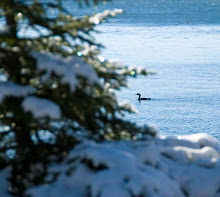The shack looks like a kindergartener's drawing of a house. It is about 10 feet square with a front door, a peaked roof, a few windows, and a pipe chimney blowing wood smoke. McPherson, who lighted the stove, has already come and gone. Inside it is warm as a sauna.
Open the door and step up from the ice onto a plywood floor that stops short of the side walls to make room for rectangular holes that have been slashed out of the frozen river with a chainsaw. Above these gaps hang a dozen or so lines attached to a 2-inch-by-2-inch beam. Nudge the beam, and it jigs the hooks.
We bait the lines with pieces of sandworm and lower them into the river where they hang, weighted with lead sinkers, some closer to the surface, some closer to the bottom.
Maine's coastal rivers usually freeze just after Christmas. Sportsmen drag their handmade shanties onto the ice. The fish to catch are smelts - tiny, sharp-toothed, silver-sided relations to salmon and trout. Fresh out of the water they smell like cucumber. Breaded with cornmeal, fried in butter, dipped in tartar sauce, and eaten off the bone, they are a superlative snack - fish to gush over.
In the winter smelt come with the tides day and night. They summer along the coast in shallow water close to shore. In fall they move up into the estuaries and winter under the ice. In spring, when the ice melts, they wiggle up the brooks to spawn - but for now all is frozen and the fishermen are waiting, lines ready, tall tales in the air.
Around Bowdoinham there are a handful of smelt camps that can be booked by the tide - little smelt villages, where for less than $50 each group gets a shack complete with wood stove, fishing lines, folding chairs, and newspaper-wrapped packets of bait. Bring your own beer.
McPherson, 54, big and bearded, has made a living from the bay and its rivers all his life. He has fished for eels, hunted ducks, and rented houseboats. For about 20 years he has maintained Jim's Smelt Camps, a cluster of ice shacks just upriver from the little Brooklyn Bridge on Route 24 in Bowdoinham.
Until sometime in March McPherson and his crew will work the camps 24 hours a day, seven days a week. In and around a shack by the road they cut firewood, watch television, cook at the snack bar (griddled hamburgers and fried potatoes), smoke cigarettes, drink coffee, plow, pack bait, stoke the stoves.
Shack renters come at all hours: old men in the morning to fill five-gallon buckets with fish; college kids during the day to gawk, drink beer, and make cellphone videos to post on Facebook; rockers at night with giggly women and boom boxes.
McPherson also keeps an upriver camp at what is known as town farm turn. "I'm the smelt chaser," he says. "That means I go where the smelt are." The camp, "for serious fishermen only," is more secluded, more expensive, and offers better fishing. After some slow fishing in the cluster by the bridge we pony up for the champagne lounge - $25 a person instead of $15.
It's worth the extra dough. Our lines start twitching a minute after they hit the water. We bend down and tug the lines out of the water. Smelt! The fish are a few inches long - shiny and squirmy, bright eyed and iridescent. To honor local tradition we bite heads off the first fish and spit them out. The still wriggling bodies go into a bucket.
For nearly four hours the lines do not stop moving. The haul is mostly smelt, big females and small males, but toward the end of the tide we pull in some white perch as well. We work the lines like puppeteers, pull fish off hooks, throw fish in buckets, and empty full buckets into a giant trash bag on the snow outside.
We fry fish for lunch in a cast-iron pan on top of the woodstove. We drink beer. We eat chips. Thick steamy vapor comes up from the cold water. The floor is wet from flapping fish. We step outside the shack, wearing T-shirts, squinting in the glare of the sun, hearing nothing but the groaning of ice, seeing just crows, and trees, and ice.
About 2 p.m. the tide turns, and McPherson arrives to pick us up. We pull the lines, squeegee the floor, and shut down the stove. The trash bag is full of fish, probably 50 pounds of perfect little silver icicles. Again, we bomb over the frozen ice. The sky above is blue, the wind burns our faces and feels so good.
Later, we fry fish for supper.
Jonathan Levitt can be reached at www.jonathanlevitt.com.
No comments:
Post a Comment